
april 2005
WORLD TRIBUNAL ON IRAQ
TO CONVENE IN ISTANBUL ON JUNE 23rd
Leading international figures among the Panel of Advocates
13 April 2005, Istanbul, Turkey - The organisers of the World Tribunal on Iraq (WTI) held a press conference today at the Sabanci University Communication Center in Istanbul providing details of the final session of the Tribunal that will be held at the Topkapi Palace Grounds in Istanbul between the 23rd and the 27th of June. The panel of advocates will include leading international figures, such as Dennis Halliday, Prof. Richard Falk and Scott Ritter (1). The final session in Istanbul will reach a decision on the 27th of June, following an examination of the results of the previous sessions as well as investigate new reports and testimonies.
“Taking its cue from the Russell Tribunal of the late 1960s, the World Tribunal on Iraq is aimed at challenging the silence around the aggression against Iraq and seeking the truth about the war and occupation in Iraq. This will be a process of listening, reflection, evaluation and informed judgement based on concrete evidence.” commented Melek Taylan, spokesperson for the WTI, at the press conference today.
The World Tribunal on Iraq is a worldwide initiative that works together in a non- hierarchical system as a horizontal network of local groups worldwide. The project consists of commissions of inquiry and sessions held around the world investigating various issues related to the war on Iraq, such as the legality of the war, the role of the United Nations, war crimes and the role of the media as well as the destruction of the cultural sites and environment (2). In these sessions, a platform was provided for people from Iraq, as well as experts and activists to articulate their concerns and demands and to present their reports.
“By this tribunal we are also aiming to leave a record to history of what actually happened and how it happened in Iraq through a book that will include all the evidence put together. Since the so called international community is at the moment incapable of judging the reasons and the actors responsible for the killings of innocent people in Iraq, the people of the world will take the initiative on its behalf.” concluded Mrs. Taylan.
For more information please contact,
WTI Office in Istanbul, + (90) 212 244 7370 or,
Tolga Temuge, International Communications and Media Coordinator, tolga.temuge@worldtribunal.org, + (356) 21 578 442
www.worldtribunal.org
NOTES:
- Dennis Halliday, former Assistant to the UN Secretary General and Director of the UN Humanitarian Aid Programme, Prof. Richard Falk, UNESCO peace prize holder and Professor of International Law, and Scott Ritter, former weapons inspector with the United Nations Special Commission (UNSCOM) on Iraq. For the full list of panel of advocates, the jury of conscience and the witnesses please refer to the WTI press kit
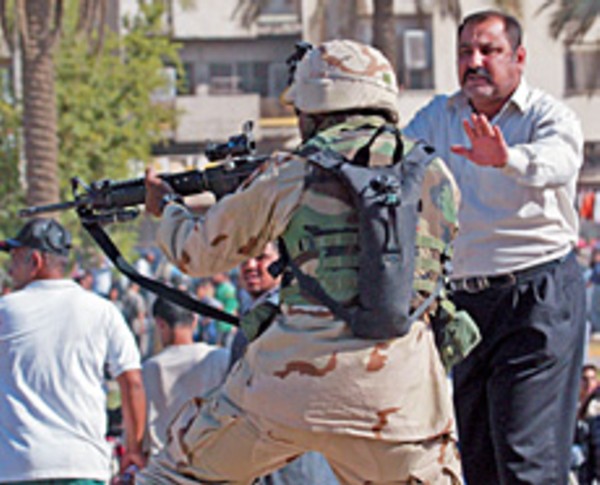
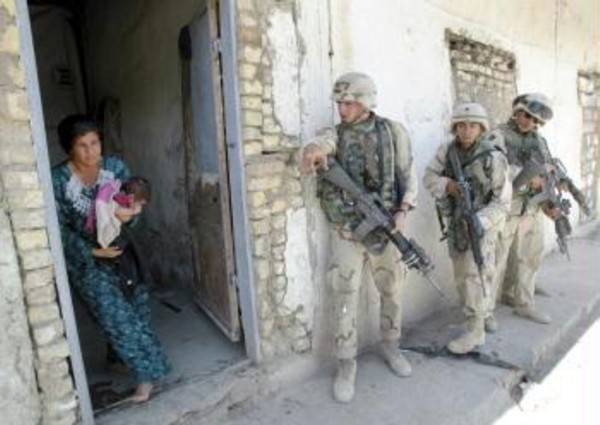
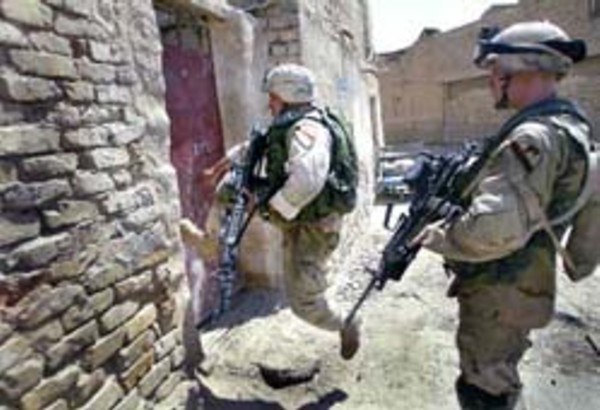
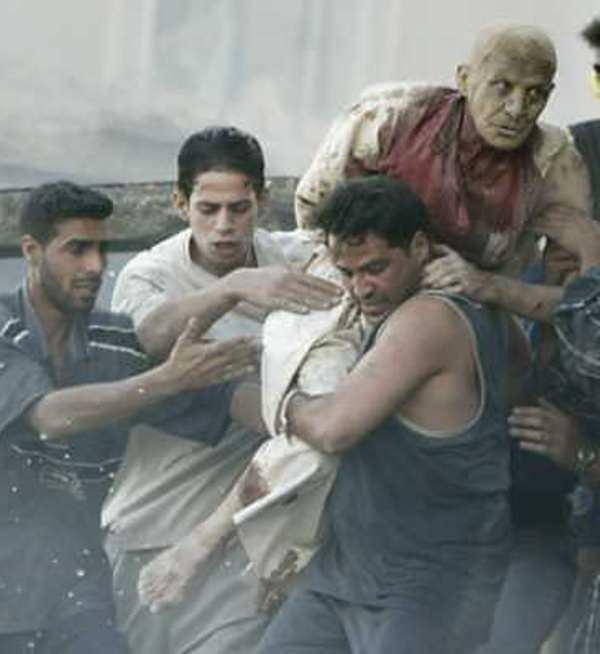
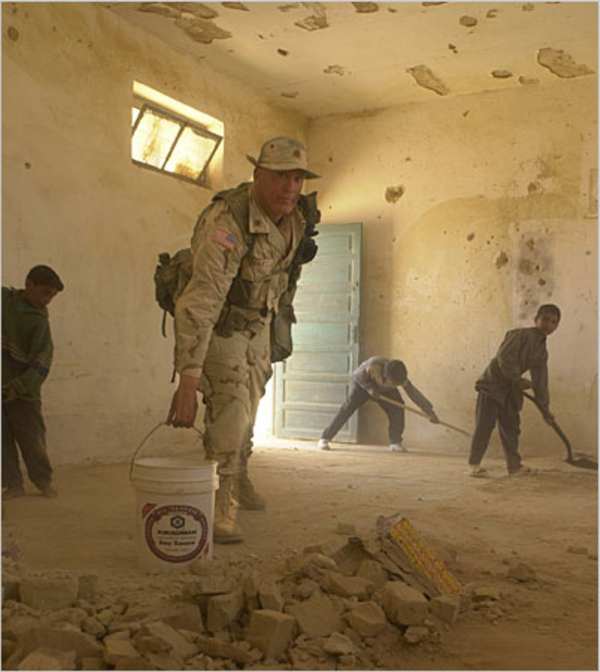
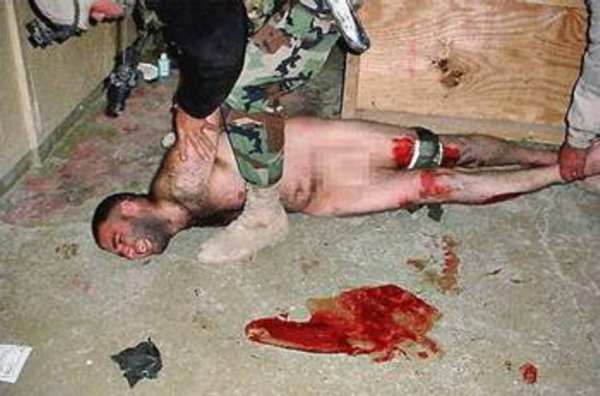
The American Knee Capping Kills
By Malcom Lagauche
March 23, 2005
http://www.uruknet.info/?s1=2&p=10590&s2=23
Equating murder and torture to a dental appointment
Shortly after the illegal invasion of Iraq by the U.S. in
March 2003, the Iraqi government broadcast a few pictures
of U.S. prisoners of war. The prisoners stated their
names and where they were from. Nothing more.
"Foul!" called the U.S. "How dare the
Iraqis parade our soldiers in front of a camera?"
Then, the U.S. propaganda elaborated on the breaking of
the rules of war and the Geneva Convention.
Hypocrites all. Tens of thousands of Iraqi and Afghani
prisoners of war (most civilian non-combatants) only wish
that the only humiliation placed on them would to be put
in front of a camera without being sexually embarrassed
or tortured.
Currently, a U.S. soldier, Private First Class Willie
Brand, is the focus of a hearing to determine if he
should be court-martialed for his role in the death of an
Afghani prisoner of war. He is accused of beating the
Afghani to death over a five-day period at Bagram Control
Point in Afghanistan.
On March 22, 2005, Al-Jazeera.net reported: An autopsy
showed that Dilawar’s (the prisoner) legs were so
damaged by blows that amputation would have been
necessary if he had survived. Dilawar died from
"blunt force trauma to the lower extremities
complicating coronary artery disease," according to
a U.S. Army report dated 6 July 2004.
Galligan (Bran’s attorney) said the knee-strike
technique is a "non-lethal mechanism utilized to
ensure compliance with a combative detainee."
The above information is laden with contradictions. First
of all, the victim was beaten for five days straight.
Then, the soldier’s lawyer calls the technique
"non-lethal," while the U.S. Army itself
concluded that the victim died because of the blows.
Unfortunately, few people in the U.S. have enough reading
skills to question how a non-lethal technique can kill
someone.Galligan is using the same tired defense of his
client just following orders. He is probably correct, but
the U.S. administration has whitewashed any attempt to
blame higher officials for the murder and torture of the
massive numbers of detainees. They say it was the lower
ranks who took it upon themselves, while the underlings
maintain they were persuaded or ordered to torture from
orders from the top of the chain of command.A blind man
can see that the torturing of Iraqis and Afghanis is so
organized that it did come from the top.
However, it also appears that a number of the enlisted
people charged in these cases actually enjoyed their
experiences. After the hearing, Brand was interviewed by
the El Paso Times newspaper. He stated, "I thought
it went reasonably well, like a dental appointment."
Recently, Charles Graner was convicted for torturing
Iraqis. This case was much more visible than that of
Brand, but the same illogic ruled.
Graner’s lawyer, Guy Womack, equated the stacking of
nude Iraqis on top of each other to "a cheerleader
pyramid." However, I have yet to see a cheerleader
pyramid with nude cheerleaders who were incarcerated.
And, many U.S. citizens have bought into this defense.
Graner, to them, was just performing his duty.
Womack had an answer for everything. When asked about
tethering prisoners together, he stated that you see the
same thing happen every day in U.S. airports when parents
keep their kids tethered. As to the allegations of tying
prisoners together with rope dunked in feces, he said,
"That’s nothing. In Texas we would have lassoed
them." How far has the U.S. descended into lunacy
and hatred? A prison guard who shoves phosphoric lights
up a person’s anus; who urinates on people; and who
beats the genitalia of another person to a pulp; and who
shows delight in such actions (all the time quoting the
Bible), is depicted as one using "good
foresight" and "creative techniques" in
torturing individuals.
I challenge our leaders again to speak out against these
actions. And, again, I will lay the blame with Democrats
and Republicans alike. Not one Democrat has stood up and
publicly demanded a full inquiry into the prisoner
abuse.Equating murder and torture to a dental appointment
or a cheerleaders’ pyramid is depraved. The fact
that the U.S. public accepts these actions is beyond
belief. The term "moral values" is being
constantly shoved down the throats of the U.S. citizenry.
Politicians, clergymen, business tycoons, athletes and
entertainers: they all are into this currently in-vogue
preaching of morality. If a 12-year-old kid slips at the
dinner table and says the word "shit," he would
immediately be reprimanded and punished. He did something
immoral. Then, after he is exiled to his bedroom, his
parents watch the nightly news and cheer on the Graners
and Brands of the world.
Did Iraqi Police Truly Kill 85 Resistance Fighters in a Camp?
By Hassan El-Najjar
Al-Jazeerah, March 24, 2005
The following is an amazing news report that even the news agency of Reuters, which reported it, is not buying it. The emphasis is added by Al-Jazeerah editor showing the points of criticism of the report.
It seems that the US-installed Iraqi government is desperate to show any success in facing the Iraqi resistance that US forces could not crush. The story of killing 85 Iraqi resistance fighters does not stand a moment of scrutiny.
First, it is illogical to accept the low casualties (only seven policemen) in a battle that allegedly lasted several hours, and in which 85 resistance fighters were killed.
Second, it is hard to believe that resistance fighters are so naive to gather in one place. This would attract the attention of the government agents and informers.
Third, how can a remote place near a lake 160 km northwest of Baghdad have electricity, as indicated by finding computers?
Fourth, the government did not air or distribute any video footage showing these alleged 85 people killed.
Fifth, It is hard to believe that from this large number of fighters all what the US-led forces could arrest was only one Algerian fighter.
Sixth, Usually there should be three times as many wounded fighters as killed ones in a battle. It is beyond comprehension that no injuries were reported, all were killed. The only left explanation is using chemical weapons or other weapons of mass destruction.
Seventh, it is unlikely that Arab volunteers fighting with the Iraqi resistance would be carrying identity cards which show their countries of origin, particularly because they know it is a goal of the US-installed Iraqi government to exaggerate the presence of Arab fighters in the Iraqi resistance movement.
Eighth, the government claimed that the resistance training camp was in a remote location west of Tikrit and Samarra, where U.S. troops have had a presence for nearly two years. As the Reuters report exclaimed, it was not clear how such a large camp could have been established without earlier detection by the US or Iraqi intelligence or informers.
Finally, how can a car suicide bomb exploding in a US patrol in Mosul not result in US deaths or injuries?
This is an example of daily reports from Iraq. Most of the Iraqi resistance attacks are not reported and activities of US-led forces are exaggerated. In deed, the first casualty of war is the truth.
MEDIA
ALERT: "NO GREAT WAY TO DIE" - BUT THE GENERALS
LOVE NAPALM
Exchange With the BBC's Director of News
"These are the stories that will continue to emerge
from the rubble of Fallujah for years. No, for
generations..."
(Dahr Jamail, independent reporter in Iraq)
Heavily Conditioned Sensitivity
Traditionally, Western journalists give massive emphasis
to acts of violence committed by official enemies of the
West, while lightly passing over Western responsibility
for often far more extreme violence. As Robert Fisk has
noted:
"The atrocities of yesterday - the Beslan school
massacre, the Bali bombings, the crimes against humanity
of 11 September 2001, the gassings of Halabja - can still
fill us with horror and pity, although that sensitivity
is heavily conditioned by the nature of the perpetrators.
In an age where war has become a policy option rather
than a last resort, where its legitimacy rather than its
morality can be summed up on a sheet of A4 paper, we
prefer to concentrate on the suffering caused by 'them'
rather than 'us'." (Fisk, 'When weeping for
religious martyrs leads to the crucifixion of innocents',
The Independent, 26 March, 2005)
By contrast, the journalist Dahr Jamail recently
interviewed an Iraqi doctor from Fallujah who describes
atrocities committed by US forces during their assault on
that city last November. The doctor, now a refugee in
Jordan and speaking on condition of anonymity, insists
his testimony is backed up by video and photographic
evidence.
According to the doctor, during the second week of their
attack US forces "announced that all the families
[had] to leave their homes and meet at an intersection in
the street while carrying a white flag. They gave them 72
hours to leave and after that they would be considered an
enemy. We documented this story with video - a family of
12, including a relative and his oldest child who was 7
years old. They heard this instruction, so they left with
all their food and money they could carry, and white
flags. When they reached the intersection where the
families were accumulating, they heard someone shouting
'Now!' in English, and shooting started everywhere."
(Jamail, 'Stories from Fallujah', 8 February, 2005, http://dahrjamailiraq.com/weblog/archives/dispatches/000196.php)
A surviving eyewitness told the doctor everyone in the
family was carrying white flags, as instructed.
Nevertheless, the witness watched as his mother was shot
in the head and his father was shot through the heart by
snipers. His two aunts were also shot, and his brother
was shot in the neck. The survivor stated that when he
raised himself from the ground to shout for help, he too
was shot in the side. The doctor continued: "After
some hours he raised his arm for help and they shot his
arm. So after a while he raised his hand and they shot
his hand."
A six year-old boy was standing over the bodies of his
parents, crying, and he too was shot.
"Anyone who raised up was shot," the doctor
said, adding that he had photographs of the dead and also
of survivors' gunshot wounds.
Grisly Accounts - A Few Questions For The BBC
On 15th February, Media Lens contacted the BBC's director
of news, Helen Boaden, and asked whether the BBC was
investigating these specific allegations of US
atrocities. Her response came via a BBC spokesperson:
"The conduct of coalition forces has been examined
at length by BBC programmes, and if justified, that will
continue to be the case." (Email from BBC Press
Office, 23 February, 2005)
In a follow-up query sent on February 25, we asked which
BBC programmes had addressed the conduct of
"coalition" forces in Fallujah, including the
above evidence of war crimes. Our email was ignored.
Meanwhile, further evidence of US war crimes continued to
emerge. Aljazeera reported on March 3:
"Dr. Khalid ash-Shaykhli, an official at Iraq's
health ministry, said that the U.S. military used
internationally banned weapons during its deadly
offensive in the city of Fallujah."
The official reported evidence that US forces had
"used... substances, including mustard gas, nerve
gas, and other burning chemicals in their attacks in the
war-torn city."
Fallujah residents described how they had seen
"melted" bodies in the city, indicative of
usage of napalm, a lethal cocktail of polystyrene and jet
fuel that incinerates the human body. ('US used banned
weapons in Fallujah - Health ministry', 3 March, 2005, http://www.aljazeera.com/cgi-bin/news_service/middle_east_full_story.asp?service_id=7216)
Claims are one thing, but can these allegations be
corroborated? American documentary film-maker Mark
Manning recently returned from Fallujah after delivering
medical supplies to refugees. Manning was able to
secretly conduct 25 hours of videotaped interviews with
dozens of Iraqi eyewitnesses - men, women and children
who had experienced the assault on Fallujah first-hand.
In an interview with a local newspaper in the United
States, Manning recounted how he:
"... was told grisly accounts of Iraqi mothers
killed in front of their sons, brothers in front of
sisters, all at the hands of American soldiers. He also
heard allegations of wholesale rape of civilians, by both
American and Iraqi troops. Manning said he heard numerous
reports of the second siege of Falluja that described
American forces deploying - in violation of international
treaties - napalm, chemical weapons, phosphorous bombs,
and 'bunker-busting' shells laced with depleted uranium.
Use of any of these against civilians is a violation of
international law."(Nick Welsh, 'Diving into
Fallujah", Santa Barbara Independent, 17 March,
2005, http://www.independent.com/cover/Cover956.htm)
We pressed Boaden to explain why the BBC news had devoted
so little attention to these repeated allegations of US
atrocities, or to the evidence of the use of banned
weapons in Fallujah. Boaden responded:
Dear David Cromwell,
Thank you for your latest e-mails to me and my
colleagues. Our bureau in Baghdad and our defence
correspondent are aware of the particular claims to which
you refer. Naturally, independent verification of these
reports is vital - and, as you know, our movements within
Iraq are severely restricted for security reasons.
However, Fallujah is an ongoing issue and our team in
Baghdad are constantly talking to contacts about what
happened there and are assessing all the information they
receive. Our World Current Affairs teams are also looking
into a range of related issues.
Regarding the allegation that the Americans used
internationally banned weapons during the assault on
Fallujah, one of our correspondents who was an
"embed" with the US troops in Fallujah said
that he saw no evidence of the use of such weapons and
that there was never any reference made to them at the
confidential pre-assault military briefings he attended.
Paul Wood also says: "The character of the fighting
that I saw was bloody, old-fashioned clearing of houses
and buildings street by street, block by block, the kind
of fighting which is done with little more than an M16
and a handful of grenades. It doesn't make sense to use
mustard gas, nerve agents, other chemical agents or
nuclear devices -- to quote the Al Jazeera story -- in
such a small space also occupied by your own forces.
The Americans certainly did possess terrifying weapons,
such as 155mm artillery, or M1 A1 Abrams tanks, and I
questioned the Marines about the use of such powerful
arms in an area which might still contain civilians. But
I repeat the point made by my editors, over many weeks of
total access to the military operation, at all levels, we
did not see banned weapons being used, deployed, or even
discussed. We cannot therefore report their use. Of
course, we keep an open mind and will always investigate,
and report, any hard evidence which comes to light.
Yours sincerely,
Helen Boaden
Director, BBC News (Email to Media Lens, 7 March, 2005)
We replied two days later:
Dear Helen Boaden,
Many thanks for responding; it's much appreciated. I am
pleased to hear that the BBC is pursuing vigorously the
mounting evidence of US atrocities in Fallujah.
There are a couple of points about your response I would
like you to clarify, please. You say that the BBC had
"total access to the military operation, at all
levels". Would you please justify this claim.
Secondly, you have marked your response as "private,
not for publication". What is in it that you do not
want brought to public attention?
I look forward to hearing from you soon.
best wishes,
David Cromwell (Email, 9 March, 2005)
Boaden replied:
Thank you for your further email. We treat correspondence
as private as a rule and have concerns about distortions
arising if we are quoted out of context. If you wish to
publish our responses, please go through the BBC's press
office.
In response to your query, Paul Wood says that total
access meant that he was never stopped from going into
any meeting he asked to go into. He was embedded at
battalion level but , for instance, he did show up
several times (and film) at the colonel's morning meeting
with senior staff, where orders were given out.
Paul says, " Most importantly, I also attended the
eve of battle briefing for the battalion, at which there
were slides and folders with "Top Secret"
stamped all over them.
"At this briefing, we were given exactly the same
information as the officers who were about to command the
Marines in battle. We knew what they knew. There was
incredibly sensitive information, such as the latest
satellite imagery of the insurgents and the distilled
"humint" or human intelligence, such as it was,
on the insurgents' movements and strength. We were, of
course, covered by the rules of the embed, which were
particularly strict about operational security. That
meant I couldn't go on air with the battle plan before it
started, or at any stage go into details about the exact
rules of engagement. Total access also meant access on
the ground, going out with individual patrols, hearing
the orders as they were given out, seeing how they were
implemented. "
Paul Wood believes that if the US military were going to
use banned weapons the troops would have to be briefed in
advance. At the meetings he attended there was no such
briefing. Paul stresses that the point about these kinds
of banned weapons is that they do not discriminate
between friendly and enemy forces. That means you have to
make sure your troops know and you have to make sure they
have the necessary NBC kit.
Paul says, "We would have seen the Americans in full
NBC kit, much as they were when they fought their way up
to Baghdad in March 2003. That is why I just don't think
it plausible that these weapons were used. "
Compellingly, Paul Wood has had meetings with the
relevant specialists at Human Rights Watch, who have been
very tough on the US military as regards abuses in Iraq
and Afghanistan. Paul asked them specifically about
banned weapons in Fallujah.They said they had heard the
claims, had made some [sic] investigations, and had found
no evidence that such weapons had been used. They also
found the idea implausible for the reasons Paul states
above. He also says that HRW had seen no evidence of
napalm use -- nor the nuclear, chemical, and biological
weapons claimed [sic] by Al Jazeera and Media Lens.
Yours sincerely,
Helen Boaden
Director, BBC News (Email, 17 March, 2005)
Media Lens then replied:
Many thanks for your latest email. I appreciate your
taking the time and trouble to send it.
Your response does not support your earlier assertion
that the BBC "had total access to the military
operation, at all levels". I note that you have, in
fact, backed down from that claim given that you state
that it means simply that Paul Wood "was never
stopped from going into any meeting he asked to go
into." That is not at all the same thing. Also, Wood
says that he "attended the eve of battle briefing
for the battalion". What evidence does he have that
this was the +only+ such briefing?
Are you aware that US marines have, in fact, already
admitted that they have used an upgraded version of
napalm? (Andrew Buncombe, 'US admits it used napalm bombs
in Iraq', The Independent on Sunday, 10 August, 2003).
The upgraded weapon, which uses kerosene rather than
petrol, was deployed when dozens of napalm bombs were
dropped near bridges over the Saddam Canal and the Tigris
river, south of Baghdad. As Andrew Buncombe reported in
the Independent on Sunday:
"We napalmed both those bridge approaches,"
said Colonel James Alles, commander of Marine Air Group
11. "Unfortunately there were people there... you
could see them in the cockpit video. They were Iraqi
soldiers. It's no great way to die. The generals love
napalm. It has a big psychological effect."
Also, you will be aware that BBC Worldwide Monitoring has
picked up multiple media reports of US use of poisonous
gas in Falluja. For example, this item dated 2 March in
the Lexis-Nexis database:
"Text of report by Abd-al-Hamid Abdallah in Baghdad
headlined 'Occupation forces use apple-scented poisonous
gas against residents of Al-Fallujah' carried on Saudi
newspaper Al-Jazirah web site on 28 February.
"Sources from Iraq's Association of Muslim Scholars
who have recently visited Al-Fallujah say the occupation
forces used poisonous gas against the inhabitants of the
city in the last couple of days."
If BBC Worldwide Monitoring is relaying such reports, why
is the BBC not ever referring to them in its news
bulletins? You refer to HRW who had "made some
investigations". How comprehensive were they? What
about the investigations and reports made by Iraqi
medical staff and Dr. Khalid ash-Shaykhli, an official at
Iraq's health ministry? Why have you dismissed those?
This would appear to contravene BBC producers' guidelines
on balance, fairness, accuracy and impartiality.
Re: atrocities carried out by US forces. Are you aware of
a newspaper interview with two men from Falluja -
physician Mahammad J. Haded and Mohammad Awad, director
of a refugee centre - in the German daily Junge Welt,
Week final supplement, Feb 26, 2005? Excerpt:
"I saw in Falluja with own eyes a family that had
been shot by U.S. soldiers: The father was in his
mid-fifties, his three children between ten and twelve
years old. In the refugee camp a teacher told me she had
been preparing a meal, when soldiers stormed their
dwelling in Falluja. Without preliminary warning they
shot her father, her husband and her brother. Then they
went right out. From fear the woman remained in the house
with the dead bodies. In the evening other soldiers came,
who took her and her children and brought them out of the
city. Those are only two of many tragedies in
Falluja." (International Action Center,
"Fallujah was wiped out", http://www.iacenter.org/jc_falluja.htm)
Why are such tragedies given such scant coverage, if any,
by BBC news? Would you please retract your assertion that
claims of nuclear, chemical and biological weapons use
have been made +by+ Media Lens. That is incorrect. We are
asking the BBC to report such claims; an entirely
different matter.
I am pleased that we are able to undertake a polite,
civilised and rational exchange of views. Could you
please explain why this cannot appear on the BBC website
- for example on your Newswatch pages? Failing that,
Media Lens would be pleased to host this exchange at our
own website.
I look forward to hearing from you soon.
best wishes,
David Cromwell
co-editor
Media Lens (Email, 21 March, 2005)
Within four hours we received the following abrupt
dismissal:
Dear David Cromwell
Thank you for your further email. However, I do not
believe that further dialogue on this matter will serve a
useful purpose.
Yours sincerely
Helen Boaden
Director, BBC News (Email, 21 March, 2005)
We at Media Lens do not know whether US forces have used
banned weapons in their attack on Fallujah. However, it
is remarkable that the BBC is, in effect, suppressing
repeated and persistent reports of their +alleged+ use.
Even more depressing is the failure of the BBC to convey
the sheer scale of the horror inflicted upon Iraqi
civilians. Dahr Jamail notes:
"The military estimates that 2,000 people in
Fallujah were killed, but claims that most of them were
fighters. Relief personnel and locals, however, believe
the vast majority of the dead were civilians."
(Jamail, 'An Eyewitness Account of Fallujah', 16
December, 2004, http://www.dahrjamailiraq.com/hard_news/archives/2004_12_19.php)
A report on Fallujah presented to the 61st session of the
United Nations Commission on Human Rights by the
Baghdad-based Studies Center of Human Rights and
Democracy appeals to the international community:
"What more tragedies are the international bodies
waiting for in order to raise their voices demanding to
stop the massacres and mass killings of the
civilians?"
The report warns that "there are mass graves in the
city" and "the medical authorities and the
citizens could not find the burial ground of 450 bodies
of the citizens of Fallujah that the American occupation
forces have photographed and buried in a place that is
still unknown." (SCHRD, 'Report on the current
situation in Fallujah', 26 March, 2005, http://www.brusselstribunal.org/pdf/lastReportFallujah%20crimes.pdf)
We understand that lack of security means there are
severe difficulties in reporting from Iraq. But as
independent reporters like Dahr Jamail and Mark Manning
have shown, it +is+ possible to obtain detailed testimony
relating to possible war crimes in Fallujah - testimony
that surely merits discussion. The BBC's grievous
omissions highlight, once again, its longstanding
complicity in Western mass violence.
SUGGESTED ACTION
The goal of Media Lens is to promote rationality,
compassion and respect for others. When writing emails to
journalists, we strongly urge readers to maintain a
polite, non-aggressive and non-abusive tone.
Write to Helen Boaden, BBC news director:
Email: helen.boaden@bbc.co.uk
Please also send all emails to us at Media Lens: